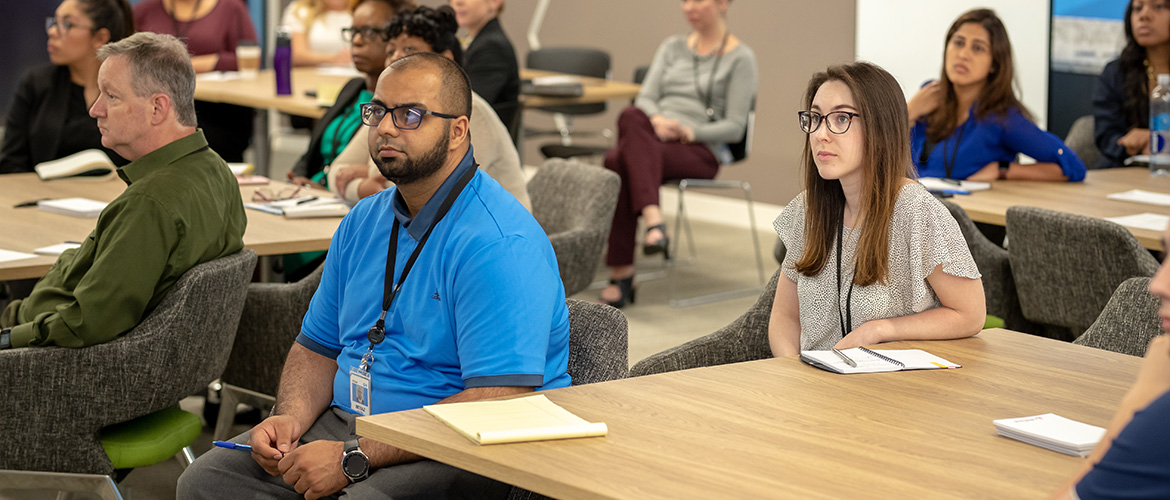When people think of a learning space, they rarely think of a cubical. But in most offices, cubes and conference rooms play double duty — a place for work and a place for training.
Newsroom | Company News

Senior recruiter Hildi Forton and classmates learn during a Blue University course. (Photo by Ben Hershey)
A Learning Oasis at Work
“You have so many things going on and it’s hard to think, ‘OK, I want to intentionally make time to visit the course and put everything else on pause,’” says Hildi Forton, a senior recruiter for Health Care Service Corporation.
That’s one of the reasons the company is creating space dedicated to training and development at 22 of its offices.
This includes a dedicated learning space at the company’s Chicago headquarters. The space on the 45th floor, which opened in April, includes large classrooms, a student lounge, smaller rooms for group study and couches and chairs ideal for reading or individual study.
“We wanted people to have a dedicated space to exit the workplace and go to a place to learn and fully focus on keeping their skills fresh,” says Josh Smith, divisional vice president of learning and Blue University for HCSC. “The right learning space, physical or online, is important to enable the brain to absorb information and take it back to your day-to-day job."
Forton has attended two courses in the new learning space. It’s outfitted with large-screen TVs for presentations, video cameras to enable online virtual learning, rolling white boards, comfortable chairs and large tables. There isn’t a cube in sight.
“It’s a different feel, a different mindset you step into, and it’s easy to step away,” Forton says.
Spotlight on learning
The renovated physical spaces are part of the company’s Blue University, a resource for employees to go for any of their learning needs.
Many classes are held in the new in-office classrooms, but they are also available virtually for off-site learning. Others are exclusively online and self-paced.
“The right learning space, physical or online, is important to enable the brain to absorb information and take it back to your day-to-day job.”
Blue University is made up of seven “colleges” that cover topics at the core of day-to-day operations at the five Blues Plans, and together they offer more than 60,000 courses, as well as access to periodicals and books.
The courses include basic technical skills and competencies as well as professional and leadership development. Forton took courses called Collaborative Solutions and Be the CEO of Your Own Career.
Blue University also has courses covering basics of different parts of the health care business, like service delivery and health care management.
“If you’re just curious about a team or another division within the organization, this is a great way to at least scratch the surface or find out a little bit more about what they’re all about,” Forton says.
And the offerings extend beyond company-driven courses. Blue University also offers network certifications and hosts an evening MBA program through external academic partnerships.
Together, Blue University lays the groundwork for developing and teaching new skills to the company’s current workforce for future success.
“It’s not the training you took that lands the job, it’s the experience,” Smith says. “Blue University enables you to have successful experiences in your career.”
